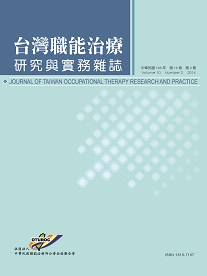Journal of Taiwan Occupational Therapy Research and Practice

半年刊,正常發行
目的:探討在健保總額預算期間,職能與物理治療師(以下統稱治療師)的工作倦怠及離職意向。方法:採用橫斷式問卷調查,對桃園縣治療師以分層比例隨機取樣,邀請治療師填寫問卷。以工作倦怠-醫療行業調查 (MBI-HSS)(含三個向度:情緒耗竭、去人性化、個人成就)來測量工作倦怠。結果:2006年7 - 12月得有效問卷96份 (56.1%)。職能治療師29位 (30.2%),物理治療師67位 (69.8%)。情緒耗竭的平均數為25.63(百分位為39.7)、去人性化為9.07(百分位為25.7)、個人成就為35.92(百分位為64.1)。多變量分析結果顯示,健保總額預算前後工作感受改變 (p = .0013)、醫療工作的壓力源感受 (p = .0035)及支持性因應 (p = .0340),與情緒耗竭有統計顯著關係。醫療院所層級 (p = .0035)、治療師類別(職能、物理治療師) (p = .0278)及控制性因應 (p = .0506),與去人性化有統計顯著關係。控制性因應 (p = .0002)與個人成就有統計顯著關係。高達49位 (51%)治療師有離職意向。多變量分析結果顯示,薪資滿意度 (p = .0014)與情緒耗竭 (p = .0221)對離職意向有統計顯著關係。結論:健保實施總額預算期間,治療師的情緒耗竭嚴重,高達一半的治療師有離職意向。治療師離職意向的原因是情緒耗竭、對薪資不滿意。
Aims: To study job burnout and quit intention among occupational and physical therapists and the related factors during the implementation of the global budget payment system of the National Health Insurance in Taiwan. Methods: A cross-sectional study with a stratified and proportional random sampling was used to obtain the study sample in Taoyuan, Taiwan. The Maslach Burnout Inventory-Health Service Survey (MBI-HSS), including three constructs (emotional exhaustion, depersonalization, personal accomplishment), was used. Results: From July to December 2006, 96 valid questionnaires (56.1%) were obtained. Twenty-nine (30.2%) were occupational therapists and 68 (69.8%) were physical therapists. The mean score of emotional exhaustion was 25.63 (percentile = 39.7), depersonalization was 9.07 (percentile = 25.7), and personal accomplishment was 35.92 (percentile = 64.1), respectively. Multivariate analysis reveals that work perceptions about the global budget for medical employees ( p= .0013), medical workers stress ( p= .0035), and supported coping ( p= .0340) was significantly associated with emotional exhaustion. Hospital level, type of therapist (occupational vs. physical) and control coping was significantly associated with depersonalization. Control coping ( p= .0002) was significantly associated with personal accomplishment. Forty-nine (51%) of therapists had an intention to quit their job. Multivariate analysis reveals that salary satisfaction ( p= .0014) and emotional exhaustion ( p= .0221) was significantly associated with quit intention. Conclusion: During implementation of global budget payment system, there was a serious problem of emotional exhaustion among therapists and about one half of the therapists had an intention to quit their job. The reason of quit intention was emotional exhaustion and unsatisfying of their salary.












